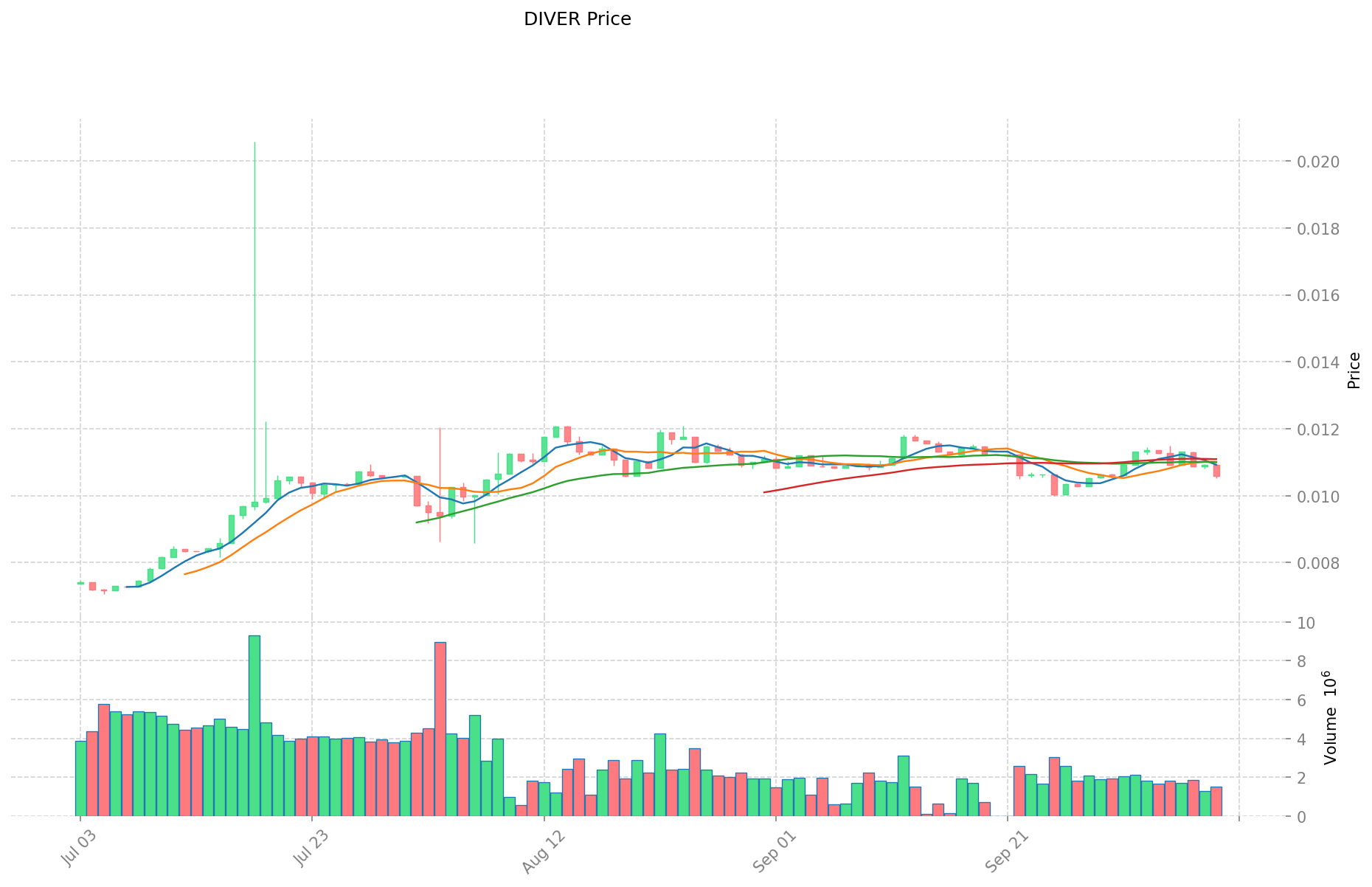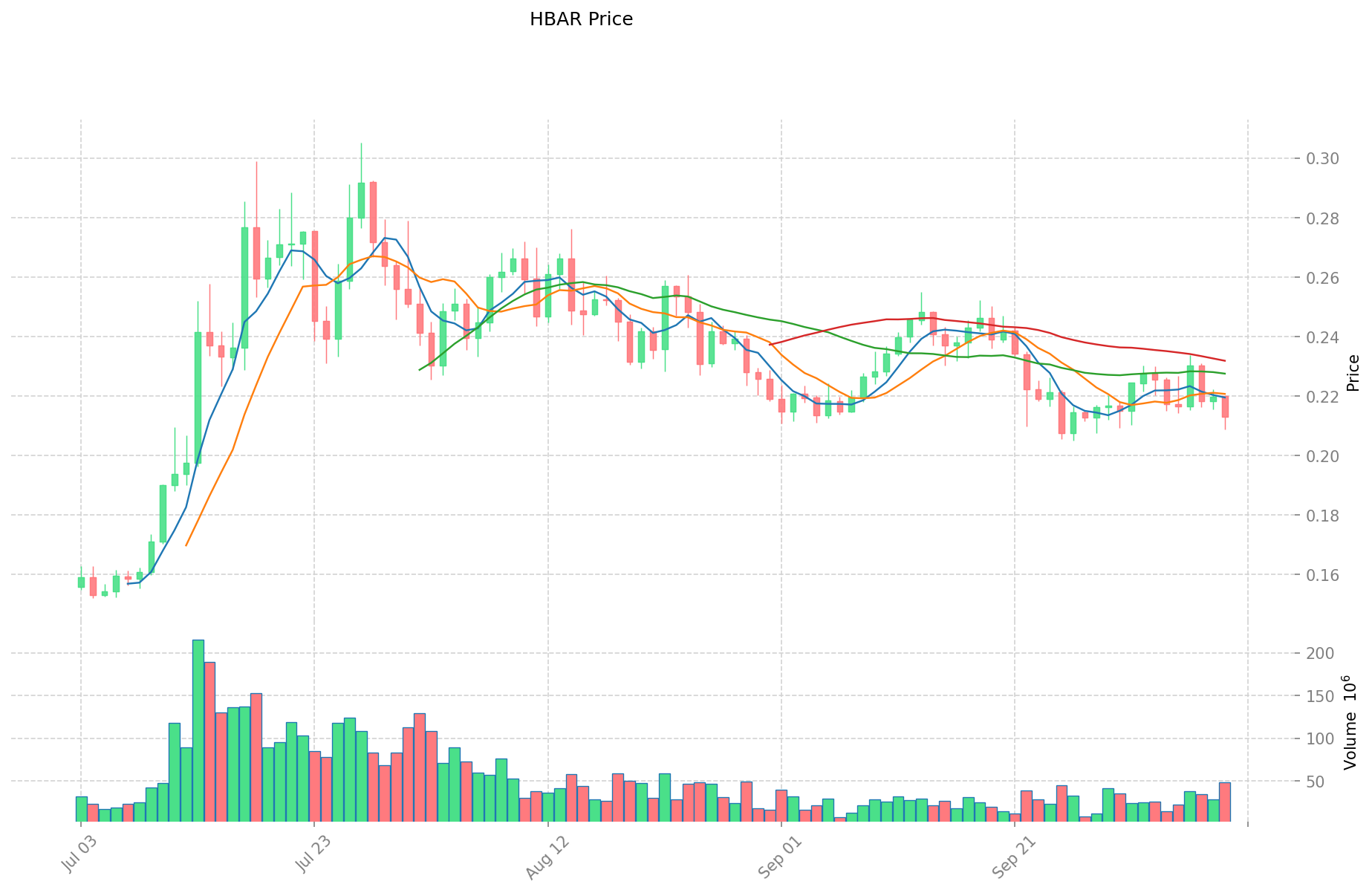DIVER vs HBAR: Comparing Two Innovative Blockchain Technologies for Enterprise Solutions
Introduction: Investment Comparison of DIVER vs HBAR
In the cryptocurrency market, the comparison between Divergence Protocol (DIVER) vs Hedera (HBAR) has always been an unavoidable topic for investors. The two not only have significant differences in market cap ranking, application scenarios, and price performance, but also represent different positions in crypto assets.
Divergence Protocol (DIVER): Since its launch in 2021, it has gained market recognition for its decentralized platform for hedging and trading DeFi-native asset volatility.
Hedera (HBAR): Introduced in 2020, it has been hailed as a fast, secure, and fair public ledger network, being one of the cryptocurrencies with high global transaction volume and market capitalization.
This article will comprehensively analyze the investment value comparison between DIVER vs HBAR, focusing on historical price trends, supply mechanisms, institutional adoption, technological ecosystems, and future predictions, attempting to answer the question investors care about most:
"Which is the better buy right now?"
I. Price History Comparison and Current Market Status
DIVER (Coin A) and HBAR (Coin B) Historical Price Trends
- 2021: DIVER reached its all-time high of $0.454064 on October 18, 2021, likely due to increased interest in DeFi platforms.
- 2020: HBAR saw significant growth, with its price rising from its all-time low of $0.00986111 on January 3, 2020.
- Comparative analysis: In the recent market cycle, DIVER dropped from its all-time high of $0.454064 to a low of $0.00490827, while HBAR has shown more resilience, maintaining a higher price level relative to its historical lows.
Current Market Situation (2025-10-10)
- DIVER current price: $0.010585
- HBAR current price: $0.21296
- 24-hour trading volume: DIVER $16,708.55 vs HBAR $10,191,873.43
- Market Sentiment Index (Fear & Greed Index): 64 (Greed)
Click to view real-time prices:
- View DIVER current price Market Price
- View HBAR current price Market Price


II. Core Factors Affecting the Investment Value of DIVER vs HBAR
Supply Mechanism Comparison (Tokenomics)
- DIVER: Fixed total supply of 1 billion tokens with a deflationary model where tokens are burned with each transaction
- HBAR: Maximum supply of 50 billion tokens with gradual release through a predetermined distribution schedule
- 📌 Historical pattern: Deflationary mechanisms like DIVER's tend to support price appreciation over time, while HBAR's larger supply with gradual release can create selling pressure.
Institutional Adoption and Market Applications
- Institutional holdings: HBAR has stronger institutional backing with Hedera Governing Council members including Google, IBM, Boeing, and Deutsche Telekom
- Enterprise adoption: HBAR leads in enterprise applications with use cases in cross-border payments, supply chain, and identity verification; DIVER is still building its enterprise partnerships
- National policies: Hedera has engaged with regulatory bodies more extensively, while DIVER has focused on compliance but has fewer formal regulatory relationships
Technical Development and Ecosystem Building
- DIVER technical upgrades: Recent smart contract functionality improvements and upcoming cross-chain bridges
- HBAR technical development: Continuous improvements to the hashgraph consensus algorithm, increased TPS capabilities, and enhanced smart contract functionality
- Ecosystem comparison: HBAR has a more developed enterprise ecosystem, while DIVER has focused on DeFi applications and community-driven development
Macroeconomic Factors and Market Cycles
- Performance in inflationary environments: DIVER's deflationary mechanism potentially offers better protection against inflation
- Macroeconomic monetary policy: Both tokens show sensitivity to interest rate changes and dollar strength, with HBAR displaying slightly more correlation to traditional markets
- Geopolitical factors: HBAR's enterprise focus positions it better for formal cross-border transaction needs, while DIVER may benefit from retail demand in uncertain political environments
III. 2025-2030 Price Prediction: DIVER vs HBAR
Short-term Prediction (2025)
- DIVER: Conservative $0.007974 - $0.010632 | Optimistic $0.010632 - $0.01360896
- HBAR: Conservative $0.2003892 - $0.21318 | Optimistic $0.21318 - $0.3112428
Mid-term Prediction (2027)
- DIVER may enter a growth phase, with an estimated price range of $0.011915643888 - $0.01575056376
- HBAR may enter a bullish market, with an estimated price range of $0.2527717896 - $0.4423506318
- Key drivers: Institutional capital inflow, ETF developments, ecosystem growth
Long-term Prediction (2030)
- DIVER: Base scenario $0.017562402041842 - $0.020661649460991 | Optimistic scenario $0.020661649460991 - $0.024174129869359
- HBAR: Base scenario $0.313726821960776 - $0.42395516481186 | Optimistic scenario $0.42395516481186 - $0.610495437329078
Disclaimer: The information provided is for informational purposes only and should not be considered as financial advice. Cryptocurrency markets are highly volatile and unpredictable. Always conduct your own research before making any investment decisions.
DIVER:
| 年份 | 预测最高价 | 预测平均价格 | 预测最低价 | 涨跌幅 |
|---|---|---|---|---|
| 2025 | 0.01360896 | 0.010632 | 0.007974 | 0 |
| 2026 | 0.0152718048 | 0.01212048 | 0.0086055408 | 14 |
| 2027 | 0.01575056376 | 0.0136961424 | 0.011915643888 | 29 |
| 2028 | 0.0192875925348 | 0.01472335308 | 0.0075089100708 | 39 |
| 2029 | 0.024317826114582 | 0.0170054728074 | 0.011393666780958 | 60 |
| 2030 | 0.024174129869359 | 0.020661649460991 | 0.017562402041842 | 95 |
HBAR:
| 年份 | 预测最高价 | 预测平均价格 | 预测最低价 | 涨跌幅 |
|---|---|---|---|---|
| 2025 | 0.3112428 | 0.21318 | 0.2003892 | 0 |
| 2026 | 0.369718074 | 0.2622114 | 0.188792208 | 22 |
| 2027 | 0.4423506318 | 0.315964737 | 0.2527717896 | 48 |
| 2028 | 0.413281875996 | 0.3791576844 | 0.299534570676 | 77 |
| 2029 | 0.45169054942572 | 0.396219780198 | 0.28924043954454 | 85 |
| 2030 | 0.610495437329078 | 0.42395516481186 | 0.313726821960776 | 98 |
IV. Investment Strategy Comparison: DIVER vs HBAR
Long-term vs Short-term Investment Strategy
- DIVER: Suitable for investors focused on DeFi ecosystems and volatility trading
- HBAR: Suitable for investors looking for enterprise adoption and stable growth potential
Risk Management and Asset Allocation
- Conservative investors: DIVER: 20% vs HBAR: 80%
- Aggressive investors: DIVER: 40% vs HBAR: 60%
- Hedging tools: Stablecoin allocation, options, cross-currency portfolios
V. Potential Risk Comparison
Market Risk
- DIVER: Higher volatility due to smaller market cap and DeFi sector exposure
- HBAR: Exposure to enterprise adoption cycles and competition from other enterprise-focused blockchains
Technical Risk
- DIVER: Scalability, network stability
- HBAR: Centralization concerns, potential security vulnerabilities in the hashgraph algorithm
Regulatory Risk
- Global regulatory policies may have differing impacts on both tokens, with HBAR potentially facing more scrutiny due to its enterprise focus
VI. Conclusion: Which Is the Better Buy?
📌 Investment Value Summary:
- DIVER advantages: Deflationary mechanism, focus on DeFi and volatility trading
- HBAR advantages: Strong institutional backing, enterprise adoption, established use cases
✅ Investment Advice:
- New investors: Consider a smaller allocation to DIVER for exposure to DeFi, with a larger position in HBAR for stability
- Experienced investors: Balance portfolio with both tokens, adjusting based on risk tolerance and market conditions
- Institutional investors: Focus on HBAR for its enterprise applications and regulatory engagement
⚠️ Risk Warning: The cryptocurrency market is highly volatile, and this article does not constitute investment advice. None
VII. FAQ
Q1: What are the main differences between DIVER and HBAR? A: DIVER is a decentralized platform for hedging and trading DeFi-native asset volatility, while HBAR is a public ledger network focused on enterprise applications. DIVER has a fixed supply with a deflationary model, whereas HBAR has a larger maximum supply with gradual release. HBAR has stronger institutional backing and more established use cases in cross-border payments, supply chain, and identity verification.
Q2: Which token has performed better historically? A: HBAR has shown more resilience in recent market cycles, maintaining a higher price level relative to its historical lows. DIVER reached its all-time high of $0.454064 in October 2021 but has since experienced a significant drop. HBAR has demonstrated more stable growth since its launch in 2020.
Q3: How do the supply mechanisms of DIVER and HBAR differ? A: DIVER has a fixed total supply of 1 billion tokens with a deflationary model where tokens are burned with each transaction. HBAR has a maximum supply of 50 billion tokens with a gradual release through a predetermined distribution schedule.
Q4: Which token is better suited for institutional investors? A: HBAR is generally better suited for institutional investors due to its strong institutional backing, with Hedera Governing Council members including major corporations like Google, IBM, and Boeing. It also has more established enterprise applications and has engaged more extensively with regulatory bodies.
Q5: What are the price predictions for DIVER and HBAR by 2030? A: By 2030, DIVER is predicted to reach a base scenario of $0.017562402041842 - $0.020661649460991, with an optimistic scenario of $0.020661649460991 - $0.024174129869359. HBAR is predicted to reach a base scenario of $0.313726821960776 - $0.42395516481186, with an optimistic scenario of $0.42395516481186 - $0.610495437329078.
Q6: How should investors allocate their portfolio between DIVER and HBAR? A: For conservative investors, a suggested allocation is 20% DIVER and 80% HBAR. For aggressive investors, a 40% DIVER and 60% HBAR split is recommended. However, investors should adjust based on their risk tolerance and market conditions.
Q7: What are the main risks associated with investing in DIVER and HBAR? A: DIVER faces higher volatility due to its smaller market cap and DeFi sector exposure, as well as potential scalability and network stability issues. HBAR risks include exposure to enterprise adoption cycles, competition from other enterprise-focused blockchains, centralization concerns, and potential security vulnerabilities in the hashgraph algorithm. Both tokens may be affected by regulatory risks, with HBAR potentially facing more scrutiny due to its enterprise focus.
Share
Content